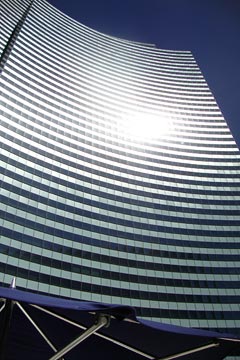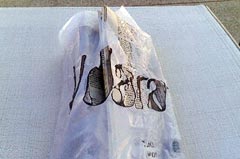Hot Architecture: Vegas 'Death Ray' Singes Tourists
AOL News LAS VEGAS (Sept. 28) -- Las Vegas resorts have long vied to be known as the hottest place in town. But that's not such a great distinction for Vdara, a 10-month-old Strip hotel-condo where a "death ray" of strong Nevada sunlight reflects off the concave, all-glass facade and onto sections of the pool deck throughout the day.

Chicago attorney Bill Pintas felt its power firsthand after returning to his lounge chair after a swim last week. "It felt like I had a chemical burn. I couldn't imagine why my head was burning," said Pintas, who owns a condo in the 57-story building. "Within 30 seconds, the back of my legs and back were burning. My first thought was, 'Jesus, they destroyed the ozone layer!'"
When the Nevada sun hits the concave, all-glass facade of the new Vdara hotel in Las Vegas, it creates a beam of concentrated solar energy that can melt plastic and singe hair.
In fact, Pintas was encountering a problem that the property's owner and developer, MGM Resorts International, knew about when it built Vdara as part of the $8.5 billion, six-skyscraper CityCenter development that bowed in December. Documents provided to AOL News show that the sunlight-concentrating design was the subject of debate among the architects and other subcontractors as the project was being completed in late 2008.
Despite what Vdara's bartenders, pool attendants and visitors mockingly call it, the problem is technically known as "solar convergence." The sun's heat is amplified as it reflects off the curved building, creating areas of increased heat that, during a midday Monday visit by AOL News, made the metal parts of some chairs dangerous to touch.
"It was fine here a little while ago, but then all of a sudden I felt like I was frying," said pool patron Danielle Civello, visiting from Dallas. "That's weird."
The problem was first reported on Saturday by the Las Vegas Review-Journal. On Monday, CityCenter CEO Bobby Baldwin walked around the pool with a group of property executives gazing up at the spot where the light hits the building and examining the ground below.
CityCenter CEO Bobby Baldwin, right, and other MGM Mirage officials stand in the area where the Vdara "death ray" beamed onto the pool deck about noon Monday.
Baldwin could not be reached for comment, but MGM Resorts spokesman Gordon Absher acknowledged to AOL News that the company plans to fix the problem.
"Hotel management is dealing with our corporate designers to find ways to create a little more consistent shade, but pools are tricky," Absher said. "Building a huge shade structure is not the answer because some people want the sun. And the sun is constantly moving. It's quite literally an astronomical challenge. We're looking for an aesthetically pleasing way to balance sun and shade features, a means for us to create more shade on that deck."
Absher said the company has applied a thin, high-tech film to the windows that does scatter some of the reflective light -- but evidently not enough.
Nick Ashton, CEO of SSAF International Ltd., has an e-mail trail and other documents showing that his company's $2.3 million bid to coat the windows with its version of a film was rejected, and that he forewarned the company it would face the problems pool-goers are now experiencing.
"When we were working on this, they were having trouble sealing the pool because of the heat," Ashton said. "Then they put the landscaping in and all the trees died within a week because of the heat. The amount of heat there is ridiculous."
Frustrated that MGM's vice president for design Bill Ham was leaning toward another vendor, Ashton chastised Ham in a November 2008 letter: "It appears that this Vdara Tower solar convergence project is not being viewed by your management team with wide open eyes. ... With a building that is this prestigious and has a persona extraordinaire, we have to be cognizant of the facade finish, the longevity of the product, the application and the internal visual views of the residents."
Courtesy Bill Pintas
Bill Pintas, a condo owner at Vdara, said the sun melted the plastic bag with his newspaper in it.

Pintas, who is a personal injury attorney, worries that such records, along with public acknowledgments from Absher that the company is aware of the issue, could make MGM liable if the "death ray" leads to a serious injury.
"There's a liability, 100 percent, yes," Pintas said. "I'm not looking to sue anybody, I didn't suffer any damages. I just want it fixed. If somebody fell asleep, they'd have very serious burns. It's just a matter of time before somebody's going to be very badly hurt."
As a resident, Pintas would like the pool staff to block off the super-hot section of the deck. But Absher said that would prove difficult, since it shifts around throughout the day as the planet revolves. He said other Vegas resorts with glass facades, including Mandalay Bay, have faced similar problems and that the added heat is welcome by some patrons in cooler parts of the year.
Not surprisingly, the Vegas blogosphere has had a very sunny field day with the story. Many suggested Vdara make the death ray its signature attraction, akin to the Paris Las Vegas resort's Eiffel Tower and Bellagio's dancing fountains. Tim Dressen, who co-hosts a Vegas tourist podcast with his wife, quipped on this weekend's show: "If you're staying at Vdara and planning to use the pool, be very careful. Make sure you slather yourself in sunscreen. Wear a sweater. People are going to be bursting into flames ..."
The Vdara tower, sandwiched between the Bellagio and the new 4,004-room hotel-casino Aria, is unusual in Vegas: It has no gambling or nightclub and is completely smoke-free. And in the blinding beam, Absher seems to see a potential silver lining.
"In this age of tweets and blogs and 24-hour news, I think people enjoy an interesting yarn, and this certainly qualifies as an interesting story," he said. "Does it concern us? No. Vdara is a first-class hotel like no other. This particular situation is something we will mitigate quickly and easily. Vdara is being discovered, and that's always a struggle in this economy."





















 The last time I heard a liberal blame Bush, I retorded that instead of President Bush at fault, I said, "blame Milord Filmore!" You should have seen their dumfounded look
The last time I heard a liberal blame Bush, I retorded that instead of President Bush at fault, I said, "blame Milord Filmore!" You should have seen their dumfounded look 